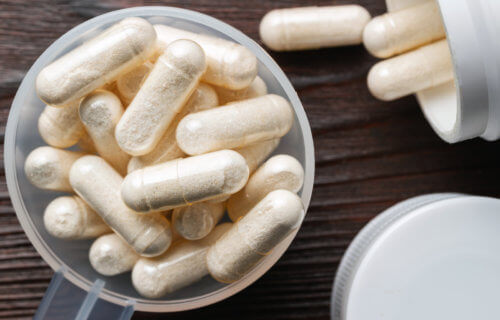SACRAMENTO, Calif. — Taking folic acid supplements could be a fatal decision during the coronavirus pandemic, a new study warns. Researchers from UC Davis have found that people with a folic acid prescription are nearly three times more likely to die from a COVID-19 infection than others.
At the same time, study authors also discovered that patients taking the common cancer drug methotrexate — which is an antifolate — cancels out this higher risk from folic acid pills.
Overall, a review of more than 380,000 British adults in the UK BioBank revealed that taking folic acid supplements increased the risk of contracting COVID by 1.5 times. Coronavirus patients with high levels of folic acid were also 2.6 times more likely to die from their illness.
“We examined whether COVID-19 diagnosis and death were related to the large doses of folic acid — five times the safe upper limit — prescribed to patients for a variety of medically approved indications. We found that the risk of becoming infected and dying from COVID-19 was significantly greater in the group treated with folic acid,” says Ralph Green, an expert on B vitamins, in a university release.
Why do people take folic acid supplements?
Folic acid is a synthetic form of vitamin B9 — or folate. Studies have shown that having a vitamin B9 deficiency can increase the risk of developing heart disease, suffering a stroke, or having children with birth defects.
Doctors prescribe folic acid for a variety of conditions, including sickle cell disease, high-risk pregnancies, and as a supplement for people taking anti-seizure medications. Additionally, folic acid supplements are a common prescription among cancer patients who are also taking methotrexate.
Methotrexate is a prescription drug that fights certain types of cancer and autoimmune diseases. The drug is an antifolate, however, which means it interferes with normal levels of folate — a substance cancer cells use to fuel the spread of the disease. Taking supplements helps cancer patients resupply these diminished levels.
How serious is the link to COVID?
Green, a distinguished professor in the UC Davis Department of Pathology and Laboratory Medicine, is building on research from 2021 that found the SARS-CoV-2 virus also hijacks a carrier’s folate to replicate more virus particles. That study suggested that COVID could be vulnerable to folate inhibitors like methotrexate.
The new study examined 380,380 participants of the UK Biobank study that had a prescription for folic acid or methotrexate between 2019 and 2021. They found 26,033 people contracted COVID during the pandemic and 820 died of the virus.
Results show people with a prescription for methotrexate and members of the general public had similar rates of COVID-19. However, those only taking folic acid supplements had a noticeably higher rate of COVID infections (5.99%). The death rate among these patients was also significantly higher (15.97%) in comparison to the control group.
“Our findings could have implications for patients who take supplementary folate to prevent complications of other pharmacological therapies,” says co-senior author Angelo Gaffo, an associate professor of medicine in the Division of Rheumatology at the University of Alabama at Birmingham.
“Although taking folate in these cases is clearly indicated, clinicians should be cautious about excessive folate intake. Of course, our results will require replication.”
“The defined safe upper limit of folic acid is one milligram. Until we have more information, it would be prudent to avoid extremely high doses of folic acid unless it is medically indicated. High folic acid would be of greater concern in unvaccinated individuals,” Green adds.
Study authors note that the study focused on people over the age of 45 who were predominantly from White European ethnicities in the U.K.
The findings appear in journal BMJ Open.

